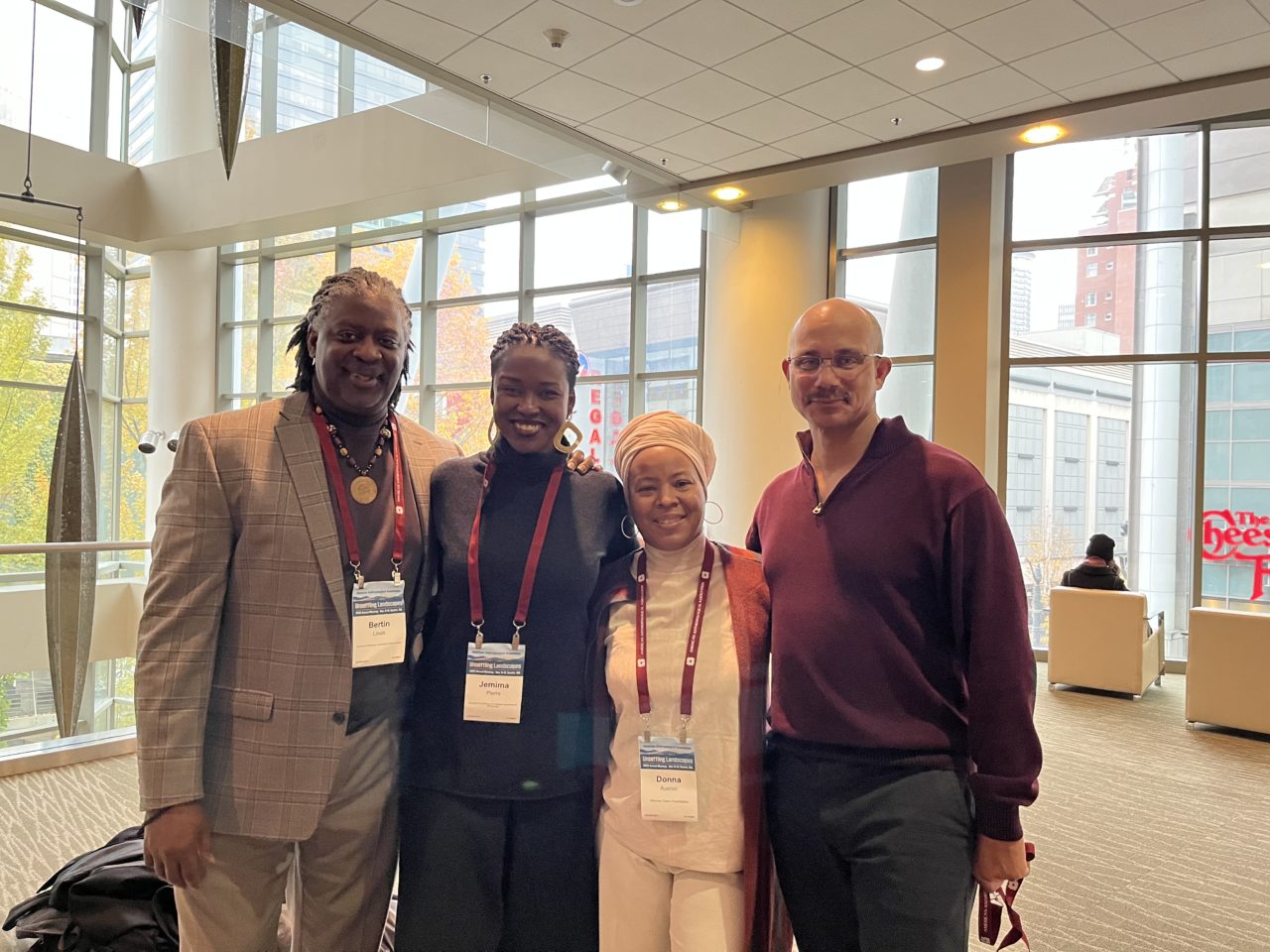PRESIDENT
Jemima Pierre
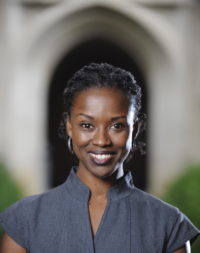 Dr. Jemima Pierre is President of the Association of Black Anthropologists (a section of the AAA) and Professor of Global Race in the Institute of Race, Gender, Sexuality and Social Justice (GRSJ) at the University of British Columbia. She is also a research associate at the Centre for the Study of Race, Gender and Class at the University of Johannesburg. Trained as a sociocultural anthropologist in the African Diaspora Program at the University of Texas, Austin, her research and teaching engages with Africa and the African diaspora across three broad areas of inquiry: 1) the relationship of political economy to race, as articulated through capitalism, white supremacy, and imperialism; 2) migration, transnationalism, and diaspora; and 3) the ethics and politics of western knowledge production and disciplinary formation.
Dr. Jemima Pierre is President of the Association of Black Anthropologists (a section of the AAA) and Professor of Global Race in the Institute of Race, Gender, Sexuality and Social Justice (GRSJ) at the University of British Columbia. She is also a research associate at the Centre for the Study of Race, Gender and Class at the University of Johannesburg. Trained as a sociocultural anthropologist in the African Diaspora Program at the University of Texas, Austin, her research and teaching engages with Africa and the African diaspora across three broad areas of inquiry: 1) the relationship of political economy to race, as articulated through capitalism, white supremacy, and imperialism; 2) migration, transnationalism, and diaspora; and 3) the ethics and politics of western knowledge production and disciplinary formation.
Dr. Pierre has published widely; her essays and articles have examined the racial history of the discipline of anthropology, race and colonialism, theories of the African diaspora, the cultural politics of racial formation in Africa, Western resource extraction in Africa, and the history and politics of U.S. imperialism in Haiti and the Caribbean. She is also the author of The Predicament of Blackness: Postcolonial Ghana and the Politics of Race. The Predicament of Blackness was winner of the 2014 Elliot Skinner Book Award in Africanist Anthropology and long listed for the 2013 OCM – BOCAS Literary Prize. Her next book, titled Of Natives, Ethnics, and True Negroes: A Counter-History of Anthropology, will be published in 2024.
PRESIDENT-ELECT
Todne Thomas
 Todne Thomas is a socio-cultural anthropologist and tenured professor. She holds a joint appointment at Yale Divinity School and Yale College. In collaboration with Afro-Caribbean and African American congregants, Thomas conducts ethnographic research on the racial, spatial, and familial dynamics of black Christian communities. Her scholarship and teaching explore intersectional constructions of power and critical forms of consciousness and practice that attend modalities of “the sacred.”
Todne Thomas is a socio-cultural anthropologist and tenured professor. She holds a joint appointment at Yale Divinity School and Yale College. In collaboration with Afro-Caribbean and African American congregants, Thomas conducts ethnographic research on the racial, spatial, and familial dynamics of black Christian communities. Her scholarship and teaching explore intersectional constructions of power and critical forms of consciousness and practice that attend modalities of “the sacred.”
Her forthcoming book From Hate to Hallows: Re-framing Black Church Arson (contracted with Duke University Press) examines the burning of a predominately black Seventh-Day Adventist Church in Knoxville, Tennessee in 2015. She argues that black church arson is an interpretive phenomenon that is best apprehended through local explanatory frameworks of religion, race, and hallowed ground.
Her book Kincraft: The Making of Black Evangelical Sociality (Duke University Press, 2021) locates a black evangelical community at the center of their own religious story, presenting their determined spiritual relatedness as a form of insurgency. Thomas argues that kincraft—the means by which church members construct one another as brothers and sisters in Christ—animates community life. Diligently genealogical, the book traces diasporic and religious antecedents of black evangelical kin-making. The ethnography accents congregants’ critical mobilizations of kincraft against normative denominational and nuclear family constructs, and some of the ethno-racial exclusions within US evangelicalism.
Thomas is also the co-editor of New Directions in Spiritual Kinship: Sacred Ties across the Abrahamic Religions (2017) with Asiya Malik and Rose Wellman. She has authored peer-reviewed articles for venues, such as the Journal of the American Academy of Religion, the Journal of Africana Religions, Anthropology and Humanism, and the Journal of African American Studies.
SECRETARY/CO-TREASURER
Bertin M. Louis, Jr.
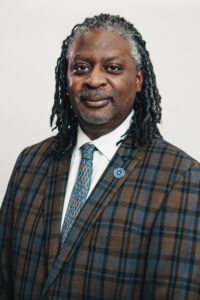 Bertin M. Louis, Jr. PhD is Associate Professor of Anthropology and African American & Africana Studies (AAAS) at the University of Kentucky. He is the winner of the 2023 Sam Dubal Memorial Award for Anti-Colonialism and Racial Justice in Anthropology from the American Anthropological Association (AAA). Louis is also the winner of the 2023-2024 Wenner-Gren Fellowship in Anthropology and Black Experiences (administered by the School for Advanced Research).
Bertin M. Louis, Jr. PhD is Associate Professor of Anthropology and African American & Africana Studies (AAAS) at the University of Kentucky. He is the winner of the 2023 Sam Dubal Memorial Award for Anti-Colonialism and Racial Justice in Anthropology from the American Anthropological Association (AAA). Louis is also the winner of the 2023-2024 Wenner-Gren Fellowship in Anthropology and Black Experiences (administered by the School for Advanced Research).
Bertin served as President of the Association of Black Anthropologists (a section of the AAA [2021-2023]), is a past Editor of Inside Higher Ed’s Conditionally Accepted column, a former contributor to Higher Ed Jobs, and a co-editor for the Truthout series called “Challenging the Corporate University.” Louis is also the co-author of the forthcoming Conditionally Accepted: Navigating Higher Education from the Margins (University of Texas Press, 2024).
Dr. Louis is also the owner and founder of Navigating Higher Education (NHE), an award-winning academic consulting firm which offers higher education-related services and empowers its clients to find and secure academic positions.
CO-TREASURER
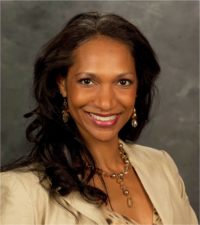
Shanti Parikh
Shanti Parikh is Chair of African and African-American Studies and Professor of Sociocultural Anthropology and of African and African-American Studies at Washington University in Saint Louis.
Professor Parikh’s research focuses on the intersections of race, gender, sexuality, and capitalism, and the politics of state and global interventions (such as public health, humanitarian aid, and legal reforms) that emerge to manage, protect, and mold populations. Her primary research has been the history and ethnography of sexuality, gender, and class in Uganda, East Africa with particular interest in how they have been shaped by the HIV epidemic and aggressive efforts to track, measure, and control what has become the most studied modern epidemic. She is currently writing an ethnography on black masculinity along the TransAfrica Highway based on over 20 years of research. She is also involved in an on-going research project on commercial sex and mobility in HIV hotspots in truck stops, fishing communities, and sugar growing regions in Uganda.
PROGRAMMING COMMITTEE
Deneia Y. Fairweather
 Deneia Y. Fairweather has a Ph.D in Applied Anthropology from the University of South Florida in Tampa, FL USA with a specialization in Applied Cultural Anthropology. She also holds a M.Ed in Reading Education and is a Certified Professional Educator with the State of Florida.
Deneia Y. Fairweather has a Ph.D in Applied Anthropology from the University of South Florida in Tampa, FL USA with a specialization in Applied Cultural Anthropology. She also holds a M.Ed in Reading Education and is a Certified Professional Educator with the State of Florida.
Dr. Fairweather is currently a Lecturer at John Jay College and has taught at Hillsborough Community College in Florida, USA and Galen University in Belize C.A. She has taught online, face to face and hybrid courses on the post-secondary level since 2018. She also worked as an Instructional Coach, an ESE Specialist and Reading teacher in primary and secondary schools for
over 14 years.
Dr. Fairweather’s research interests are situated within the field of educational anthropology. Here, she focuses on the documentation, exploration and description of educational experiences particularly among male adolescents in the African Diaspora including Belize, Brazil and Florida
USA. These experiences serve as a framework for building educational systems based on what it could look like–from a learner’s perspective.
Currently, Dr. Fairweather is the founder and owner of ESE Consulting, LLC, an educational consultant business that emphasizes diversity and inclusive education, culture building in organizations and educational institutions and the development of innovative educational technologies that promote diversity and social emotional learning. ESE Consulting, LLC offers
high-level coaching services for educators and an applied anthropological-based curriculum called Anthropology in Motion™ for adolescent youth. Results from these workshops can be found on www.aim.center.
Dr. Fairweather currently splits time between Brooklyn, New York and Tampa Florida, USA and can be reached via email at dfairweather@eseconsultinggroup.com or Whatsapp:+18134215004
Jason Vasser-Elong
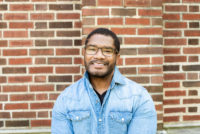 Jason Vasser-Elong is a professor in the College of Education at the University of Missouri – St. Louis, where he also earned a Master of Fine Arts degree in creative writing and studied cultural anthropology and African Diaspora studies. He is the author of Shrimp (2Leaf Press, 2018), a collection of poetry that analyzes identity in a post-colonial context. His peer reviewed essay “Treading the Atlantic” appears in the special edition of the Canadian Journal of Netherlandic Studies – special issue on “Netherlandic Migrations: Narratives from North America”. A General Anthropology Division travel award recipient for the 2021 American Anthropological Association’s annual meeting in Baltimore, MD, where he presented “Treading the Atlantic”. He has published articles in The St. Louis – Post Dispatch and The Saint Louis American newspapers. Jason’s most recent poetry can be found in SAPIENS magazine, where he served as poet-in-residence for 2022.
Jason Vasser-Elong is a professor in the College of Education at the University of Missouri – St. Louis, where he also earned a Master of Fine Arts degree in creative writing and studied cultural anthropology and African Diaspora studies. He is the author of Shrimp (2Leaf Press, 2018), a collection of poetry that analyzes identity in a post-colonial context. His peer reviewed essay “Treading the Atlantic” appears in the special edition of the Canadian Journal of Netherlandic Studies – special issue on “Netherlandic Migrations: Narratives from North America”. A General Anthropology Division travel award recipient for the 2021 American Anthropological Association’s annual meeting in Baltimore, MD, where he presented “Treading the Atlantic”. He has published articles in The St. Louis – Post Dispatch and The Saint Louis American newspapers. Jason’s most recent poetry can be found in SAPIENS magazine, where he served as poet-in-residence for 2022.
Rachel Chapman
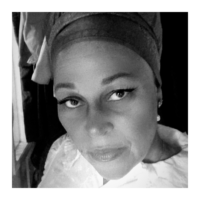
Rachel Chapman is a Black feminist activist anthropologist who uses alternative and native (alter/native), and performative, racial and social justice approaches. As an associate professor of Anthropology at the University of Washington, and adjunct associate professor in Global Health and Gender, Women and Sexuality Studies, her research, teaching and service focus on global health disparities, suffering and resistance through an intersectional, transformative justice lens, as well as identifying and addressing the effects of systemic racism in health institutions, policies and practices on communities of color. Her expertise encompasses race, racism and reproduction; survivance and liberation practices among African and African Diaspora communities; impact of structurally violent economic austerity policies on health and decolonization movements; and reproductive health trauma. Her core projects include Black women’s reproductive care-seeking; the impact of gender violence on health; HIV treatment during pregnancy; perinatal care-giving in refugee and immigrant communities; teen peace-making and restorative justice in urban communities. Her ethnography, Family Secrets: Risking Reproduction in Central Mozambique (2010), documents a decade of women’s post-civil war pregnancy and birth experiences as the HIV/AIDS epidemic exploded. New work documents Seattle’s East African refugee and immigrant community health needs and tests a community-based model of innovative perinatal care with these families. Her latest grant seeks to improve management of maternal pre-eclampsia, stress and depression and DV/intimate partner violence during COVID-19 quarantine.
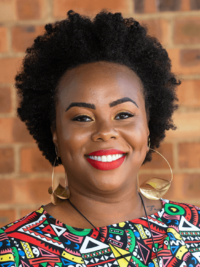 Layla D. Brown
Layla D. Brown
Layla D. Brown is an Assistant Professor of Cultural Anthropology & Africana Studies and affiliate faculty in Women’s, Gender, and Sexuality Studies. Brown’s research focuses on Pan-African, Socialist, and Feminist social movements in Venezuela, the US, and the broader African Diaspora. Layla was a 2020-2021 Research & Writing Fellow at the Johannesburg Institute for Advanced Study and a 2021-2022 Senior Research Fellow at the Käte Hamburger Kolleg / Centre for Global Cooperation Research.
COMMUNICATIONS COLLECTIVE
VP OF COMMUNICATIONS
Kaniqua Robinson
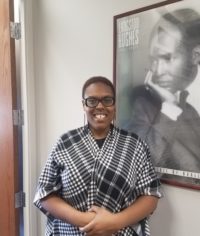
Kaniqua L. Robinson is an Assistant Professor in the Department of Anthropology at Furman University. Her research interests include politics of memory, race and the criminal justice system, Black feminism, racial politics of the U.S. South, and African American deathways. Dr. Robinson is currently working on her book manuscript based on her dissertation research (“The Performance of Memorialization: Politics of Memory and Memory-Making at the Arthur G. Dozier School for Boys), which investigates the politics involved in the memory-making processes of a state reform school in Marianna, Florida. She received her Ph.D. in Applied Anthropology (cultural) from the University of South Florida in December 2018. Dr. Robinson earned a M.A. in Anthropology and B.A. in English from Georgia State University.
Edward C. Davis IV
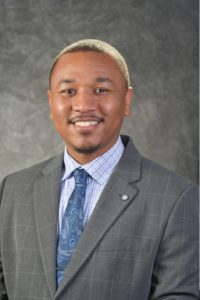 Edward C. Davis IV teaches African American Anthropology at Southland College Prep Charter High School in Richton Park, Illinois for dual-credit with Loyola University Chicago. For 8 years, Davis rebooted Africana and Anthropology at Malcolm X College as tenured faculty, Social Sciences Chair, and discipline liaison for City Colleges of Chicago. Davis became Mellon research scholar at the Margaret Walker Center at Jackson State University in Mississippi before his current post in Illinois. Davis earned an MPhil in Anthropology at University of Cambridge, and MA-PhD degrees in African Diaspora studies at University of California, Berkeley. His dissertation Beer, Blood, and the Bible: Economics, Politics, and Geolinguistic Praxis in Kongo-Ngola linked ancient Nubian pharmacological agronomics with postcolonial TV ads; centuries of uterine dynastic kinship in the Kongo Kingdom and Lunda Empire; and ethnolinguistic cultural restitution via Chokwe algorithmic lusona proverbs to restore global Native sovereignties. This research undoes the 1662 law of partus sequitur ventrem. In 1619, ancestors of his paternal grandmother’s own grandmother’s grandmother arrived in Virginia from Malanje, Angola. Davis takes pride in his Maroon DNA on the Illinois Trail of Tears in Underground Railroad homesteads. After working in Congo-Angola, Davis formed Uloño Geolinguistic Praxis Services, Inc. based on the Umbundu principle of intergenerational knowledge.
Edward C. Davis IV teaches African American Anthropology at Southland College Prep Charter High School in Richton Park, Illinois for dual-credit with Loyola University Chicago. For 8 years, Davis rebooted Africana and Anthropology at Malcolm X College as tenured faculty, Social Sciences Chair, and discipline liaison for City Colleges of Chicago. Davis became Mellon research scholar at the Margaret Walker Center at Jackson State University in Mississippi before his current post in Illinois. Davis earned an MPhil in Anthropology at University of Cambridge, and MA-PhD degrees in African Diaspora studies at University of California, Berkeley. His dissertation Beer, Blood, and the Bible: Economics, Politics, and Geolinguistic Praxis in Kongo-Ngola linked ancient Nubian pharmacological agronomics with postcolonial TV ads; centuries of uterine dynastic kinship in the Kongo Kingdom and Lunda Empire; and ethnolinguistic cultural restitution via Chokwe algorithmic lusona proverbs to restore global Native sovereignties. This research undoes the 1662 law of partus sequitur ventrem. In 1619, ancestors of his paternal grandmother’s own grandmother’s grandmother arrived in Virginia from Malanje, Angola. Davis takes pride in his Maroon DNA on the Illinois Trail of Tears in Underground Railroad homesteads. After working in Congo-Angola, Davis formed Uloño Geolinguistic Praxis Services, Inc. based on the Umbundu principle of intergenerational knowledge.
TRANSFORMING ANTHROPOLOGY EDITOR-IN-CHIEF
Aisha Beliso-DeJesus
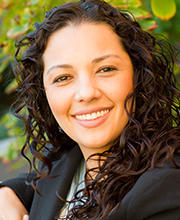 Aisha M. Beliso-De Jesús is editor of Transforming Anthropology, the flagship journal of the Association of Black Anthropologists, and Professor of Anthropology in the Departments of Spanish and Portugese and American Studies at Princeton University. A cultural and social anthropologist, Dr. Beliso-De Jesús has conducted ethnographic research with Santería practitioners in Cuba and the United States since 2003. Her book, Electric Santería: Racial and Sexual Assemblages of Transnational Religion(Columbia University Press, 2015) details the transnational experience of Santería, in which racialized and gendered spirits, deities, priests, and religious travelers remake local, national, and political boundaries and actively reconfigure notions of technology and transnationalism. Her current research, “Policing African Diaspora Religions,” draws on ethnographic research with police and religious practitioners in the United States exploring questions of race, religion, and policing.
Aisha M. Beliso-De Jesús is editor of Transforming Anthropology, the flagship journal of the Association of Black Anthropologists, and Professor of Anthropology in the Departments of Spanish and Portugese and American Studies at Princeton University. A cultural and social anthropologist, Dr. Beliso-De Jesús has conducted ethnographic research with Santería practitioners in Cuba and the United States since 2003. Her book, Electric Santería: Racial and Sexual Assemblages of Transnational Religion(Columbia University Press, 2015) details the transnational experience of Santería, in which racialized and gendered spirits, deities, priests, and religious travelers remake local, national, and political boundaries and actively reconfigure notions of technology and transnationalism. Her current research, “Policing African Diaspora Religions,” draws on ethnographic research with police and religious practitioners in the United States exploring questions of race, religion, and policing.
ARCHIVIST/HISTORIAN
Deborah Frempong
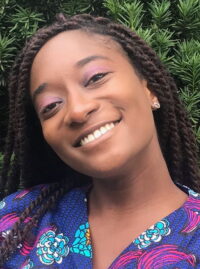 Debbie Frempong is a doctoral student in the anthropology department at Brown University. Her ethnographic project on colonial Christianity in Accra looks at the forms of womanhood that were institutionalized by several missionary churches in the mid-19th to early-20th century, and its subsequent effects on the current politics of gender and sexuality. Her more contemporary work looks at returnee women’s modes of belonging through their reintegration experiences in Accra, connecting questions about transnationalism, belonging, gendered subjectivities, and Christianity. Consequently, it explores how the gendered politics of reintegration produces and mediates ideas of modernity and (post) colonial subjectivities.
Debbie Frempong is a doctoral student in the anthropology department at Brown University. Her ethnographic project on colonial Christianity in Accra looks at the forms of womanhood that were institutionalized by several missionary churches in the mid-19th to early-20th century, and its subsequent effects on the current politics of gender and sexuality. Her more contemporary work looks at returnee women’s modes of belonging through their reintegration experiences in Accra, connecting questions about transnationalism, belonging, gendered subjectivities, and Christianity. Consequently, it explores how the gendered politics of reintegration produces and mediates ideas of modernity and (post) colonial subjectivities.
Elgin L. Klugh is an Associate Professor in the Department of Applied Social and Political Sciences at Coppin State University. He is an alumnus of Morehouse College and the University of South Florida doctoral program in Applied Anthropology. His primary research interests include heritage, cultural landscapes, community revitalization, and Genealogy. In his current role as President of the Laurel Cemetery Memorial Project, Inc., he focuses on the history and remembrance of Baltimore’s former Laurel Cemetery. Additionally, Dr. Klugh serves as the archivist and historian for the Association of Black Anthropologists.
STUDENT INTEREST GROUP (SIG) REPRESENTATIVES
Pasama Cole-Kweli
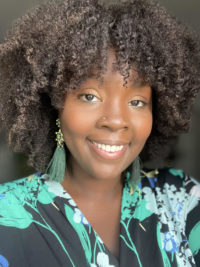 Pasama Cole-Kweli (M.A., A.B.D.) is a Ph.D. candidate in cultural anthropology at the University of Kentucky. As a Black feminist environmental ethnographer, her work expands the boundaries of how Black ecological relationships are researched and theorized in anthropology. Pasama’s dissertation research is based in the South Carolina Sea Islands and engages intergenerational knowledge, plantation landscapes, and the politics of climate change response initiatives. More broadly, her dissertation confronts the intersections of race, place, climate destruction, and rural Black futures.
Pasama Cole-Kweli (M.A., A.B.D.) is a Ph.D. candidate in cultural anthropology at the University of Kentucky. As a Black feminist environmental ethnographer, her work expands the boundaries of how Black ecological relationships are researched and theorized in anthropology. Pasama’s dissertation research is based in the South Carolina Sea Islands and engages intergenerational knowledge, plantation landscapes, and the politics of climate change response initiatives. More broadly, her dissertation confronts the intersections of race, place, climate destruction, and rural Black futures.
Pasama earned a Bachelor’s of Science at The University of Tampa (2016) and Masters of Arts at the University of Kentucky (2021). Her passion for environmentalism stems from her upbringing on her family’s farm in Pembroke Township, Illinois–an ecologically rich community disenfranchised by historic economic and environmental injustices. This lived experience drives her to amplify the voices of communities challenged by Western-centric narratives within academia and the greater public. Ultimately, she aims to use her scholarship to celebrate Black contributions to climate solutions and engage in restorative justice practices that promote social and ecological transformation. In the Association of Black Anthropologists, Pasama serves as one of the chairs of the Student Interest Group (SIG).
Alexis L. Holloway
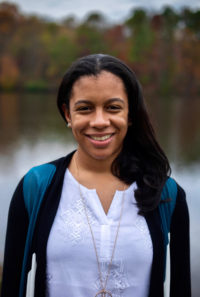 Alexis Ligon Holloway is a Visiting Instructor in Critical Race and Political Economy at Mount Holyoke. Her research explores how the mechanisms of white supremacy operate in classical music performance, examining how racial and aesthetic hierarchies position black bodies as aberrant in these spaces. As a filmmaker, Alexis hopes to produce a multi-modal dissertation, consisting of a written portion and an accompanying documentary that attends to the aural and performative aspects of her research. Alexis is currently working on the Decolonial Pedagogy Committee at Duke, collaborating with professors to create a black feminist theories syllabus for incoming Cultural Anthropology graduate students. As one of the chairs of the Association of Black Anthropologist’s Student Interest Group (SIG), Alexis is passionate about working against gate keeping practices that discourage black and other POC students from feeling welcomed and valued. In her free time, Alexis likes to play with her puppy, Penny, read Octavia Butler, play viola, and attempt to bake bread.
Alexis Ligon Holloway is a Visiting Instructor in Critical Race and Political Economy at Mount Holyoke. Her research explores how the mechanisms of white supremacy operate in classical music performance, examining how racial and aesthetic hierarchies position black bodies as aberrant in these spaces. As a filmmaker, Alexis hopes to produce a multi-modal dissertation, consisting of a written portion and an accompanying documentary that attends to the aural and performative aspects of her research. Alexis is currently working on the Decolonial Pedagogy Committee at Duke, collaborating with professors to create a black feminist theories syllabus for incoming Cultural Anthropology graduate students. As one of the chairs of the Association of Black Anthropologist’s Student Interest Group (SIG), Alexis is passionate about working against gate keeping practices that discourage black and other POC students from feeling welcomed and valued. In her free time, Alexis likes to play with her puppy, Penny, read Octavia Butler, play viola, and attempt to bake bread.
ANTHROPOLOGY NEWS EDITORS
Darlène Dubuisson
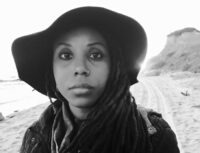 Darlène Dubuisson received her Ph.D. from Columbia University in October 2020. Her research interests and teaching span political and legal anthropology, activist and engaged anthropology, Black feminist anthropology, Black intellectual histories, migration, transnational studies, and speculative fiction and visual culture. Her work weaves analyses of Black radicalism, feminism, social and political movements, imagination, migration and diaspora, and crises and futures. Her primary geographic focus is the Caribbean and Latin America.
Darlène Dubuisson received her Ph.D. from Columbia University in October 2020. Her research interests and teaching span political and legal anthropology, activist and engaged anthropology, Black feminist anthropology, Black intellectual histories, migration, transnational studies, and speculative fiction and visual culture. Her work weaves analyses of Black radicalism, feminism, social and political movements, imagination, migration and diaspora, and crises and futures. Her primary geographic focus is the Caribbean and Latin America.
She also collaborates with Shannon Gleeson, Kate Griffith, and Patricia Campos-Medina (Cornell University) on a research project examining the effects of temporary immigration status and race on worker legal mobilization in the New York City metropolitan area.
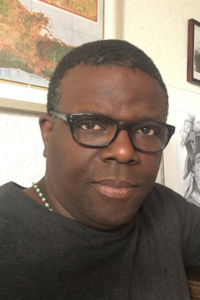
Pablo D. Herrera Veitia
Pablo D. Herrera Veitia obtained his PhD in Social Anthropology from the University of St. Andrews. He is a scholar-practitioner working at the intersection of Orisa worship, hip hop studies and multimodal ethnography. His research explores what it means to be Afro-Cuban in post-socialist Havana and follows divinatory figures in the Odù Ifá literary corpus as primary conceptual sources. As one of Cuba’s pioneering Afro-Cuban rap music producers, Herrera Veitia proposes that understanding Afro-Cubaneity today may require a focus on recent shifts in the audible character of Havana and how the city’s sonorous dimension presents itself as a site where citizens contest state ideology through loud and discrete amplification practices. Herrera Veitia is a 2018-2019 Nasir Jones Fellowship recipient at the Hiphop Archive and Research Institute, Hutchins Center for African and African American Research, Harvard University. His writing has appeared in Revista Casa de las Americas, Metronome’s documenta 12 Magazines issue, and OkayAfrica.com. He has also collaborated on several major academic research projects on rap and reggaeton music in Havana, including Sujatha Fernandez’s Cuba Represent and Close to the Edge, Tanya Saunders’s Cuban Underground Hiphop; Marc Perry’s Negro Soy Yo; and Geoff Baker’s Buena Vista in the Club.
MEMBERS AT LARGE
Corliss Heath (Medical Anthropology)
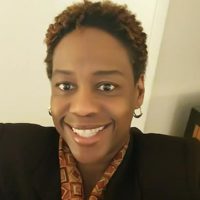 Corliss D. Heath is a Health Scientist in the Division of Policy and Data (DPD) at the Health Resources and Services Administration (HRSA)/HIV/AIDS Bureau in Rockville, MD. There she leads and coordinates various projects, while providing guidance, evaluation, implementation, and training to assure the provision of high-quality HIV intervention, care, and treatment services to people with HIV. Corliss D. Heath has nearly 30 years of professional experience in public health research. She is a graduate of Clark Atlanta University with a Bachelor of Science degree in Mathematics and a graduate of Emory University with a Master of Public Health degree in Biostatistics and a Master of Divinity degree, respectively. She also holds a PhD in Applied Anthropology specializing in Medical Anthropology from the University of South Florida (USF) (Tampa, FL). Her research interests include HIV intervention and care, mental health, religion and culture, women’s health, black feminist/womanist theory, and health inequities and inequalities.
Corliss D. Heath is a Health Scientist in the Division of Policy and Data (DPD) at the Health Resources and Services Administration (HRSA)/HIV/AIDS Bureau in Rockville, MD. There she leads and coordinates various projects, while providing guidance, evaluation, implementation, and training to assure the provision of high-quality HIV intervention, care, and treatment services to people with HIV. Corliss D. Heath has nearly 30 years of professional experience in public health research. She is a graduate of Clark Atlanta University with a Bachelor of Science degree in Mathematics and a graduate of Emory University with a Master of Public Health degree in Biostatistics and a Master of Divinity degree, respectively. She also holds a PhD in Applied Anthropology specializing in Medical Anthropology from the University of South Florida (USF) (Tampa, FL). Her research interests include HIV intervention and care, mental health, religion and culture, women’s health, black feminist/womanist theory, and health inequities and inequalities.
deandre miles-hercules (Linguistic Anthropology)
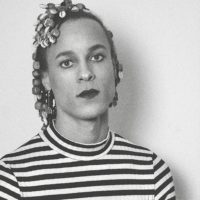 deandre miles-hercules is a Ph.D. Candidate in Linguistics at the University of California, Santa Barbara. They study how discourse organizes culture, power, and identification across axes of social differentiation, specifically focusing on Black, femme, queer, and trans communities. Their research has explored the semantic bleaching of intersectionality in academic and popular discourse, virtue signaling within the linguistic repertoire of anti-Blackness, and methodological issues in phonetic analysis of non-binary voices. Supported by a National Science Foundation Graduate Research Fellowship, miles-hercules’ work has appeared in the Journal of Linguistic Anthropology, The Oxford Handbook of Language and Sexuality (2022), Pedagogy, and Gender and Language. In addition to the Association of Black Anthropologists’ Executive Board, they sit on the Linguistic Society of America’s OMBUDS Committee and Committee on Ethnic Diversity in Linguistics. They previously served as a graduate mentor for the UCSB-HBCU Scholars in Linguistics Program. miles-hercules has been interviewed on linguistic issues for various news outlets, including Yahoo!, Vox, and VICE. They earned a BA in Linguistics, Anthropology, and African American Studies from Emory University, where they were a Robert W. Woodruff Scholar and Mellon-Mays Undergraduate Fellow. deandre is originally from Prince George’s County, Maryland, and currently based in Washington, DC.
deandre miles-hercules is a Ph.D. Candidate in Linguistics at the University of California, Santa Barbara. They study how discourse organizes culture, power, and identification across axes of social differentiation, specifically focusing on Black, femme, queer, and trans communities. Their research has explored the semantic bleaching of intersectionality in academic and popular discourse, virtue signaling within the linguistic repertoire of anti-Blackness, and methodological issues in phonetic analysis of non-binary voices. Supported by a National Science Foundation Graduate Research Fellowship, miles-hercules’ work has appeared in the Journal of Linguistic Anthropology, The Oxford Handbook of Language and Sexuality (2022), Pedagogy, and Gender and Language. In addition to the Association of Black Anthropologists’ Executive Board, they sit on the Linguistic Society of America’s OMBUDS Committee and Committee on Ethnic Diversity in Linguistics. They previously served as a graduate mentor for the UCSB-HBCU Scholars in Linguistics Program. miles-hercules has been interviewed on linguistic issues for various news outlets, including Yahoo!, Vox, and VICE. They earned a BA in Linguistics, Anthropology, and African American Studies from Emory University, where they were a Robert W. Woodruff Scholar and Mellon-Mays Undergraduate Fellow. deandre is originally from Prince George’s County, Maryland, and currently based in Washington, DC.
Tracy Rone (Applied Anthropology)
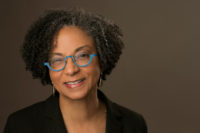 Tracy R. Rone is Interim Director of Innovation and Community Partnerships, and Associate Professor in the Department of Advanced Studies, Leadership, and Policy in the School of Education and Urban Studies at Morgan State University. She is trained as a linguistic anthropologist. Her research aims to illuminate urban education issues in high-poverty, resource-challenged contexts through an anthropological lens. She is especially interested in how identity informs academic performance, the intersection of health and educational disparities, and how narrative can be used to illuminate lived experiences in urban communities. She has served as Research Co-director for the Baltimore Education Research Consortium (BERC), a partnership founded by Baltimore City Public Schools, Morgan State University and Johns Hopkins University. She is also in engaged in work which examines the social and economic contexts of HBCUs as critical, underutilized Black ecosystems. Her activities also explore strategies for creating civic and intellectual engagement in undergraduate education. She earned a B.A. from Goucher College, a M.A. from the University of Chicago, and a Ph.D. from the University of California, Los Angeles.
Tracy R. Rone is Interim Director of Innovation and Community Partnerships, and Associate Professor in the Department of Advanced Studies, Leadership, and Policy in the School of Education and Urban Studies at Morgan State University. She is trained as a linguistic anthropologist. Her research aims to illuminate urban education issues in high-poverty, resource-challenged contexts through an anthropological lens. She is especially interested in how identity informs academic performance, the intersection of health and educational disparities, and how narrative can be used to illuminate lived experiences in urban communities. She has served as Research Co-director for the Baltimore Education Research Consortium (BERC), a partnership founded by Baltimore City Public Schools, Morgan State University and Johns Hopkins University. She is also in engaged in work which examines the social and economic contexts of HBCUs as critical, underutilized Black ecosystems. Her activities also explore strategies for creating civic and intellectual engagement in undergraduate education. She earned a B.A. from Goucher College, a M.A. from the University of Chicago, and a Ph.D. from the University of California, Los Angeles.
Jada Benn Torres (Biological/Physical Anthropology)
 Jada Benn Torres is Associate Professor of Anthropology and the director for the Laboratory of Genetic Anthropology and Biocultural Studies at Vanderbilt University in Nashville, Tennessee, USA. Her primary research area is the Anglophone Caribbean where she explores genetic ancestry and population history of African and Indigenous Caribbean peoples. A second emerging area of her research combines the tools and theories of genetic epidemiology with anthropology in order to holistically examine health disparities. This work focuses on women’s health disparities, with a specific focus on the uterine fibroids among women of African descent.
Jada Benn Torres is Associate Professor of Anthropology and the director for the Laboratory of Genetic Anthropology and Biocultural Studies at Vanderbilt University in Nashville, Tennessee, USA. Her primary research area is the Anglophone Caribbean where she explores genetic ancestry and population history of African and Indigenous Caribbean peoples. A second emerging area of her research combines the tools and theories of genetic epidemiology with anthropology in order to holistically examine health disparities. This work focuses on women’s health disparities, with a specific focus on the uterine fibroids among women of African descent.
AWARDS COMMITTEE CHAIR
Riché J. Daniel Barnes
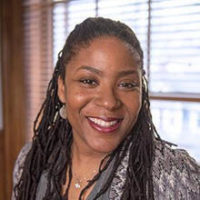 Riché J. Daniel Barnes is Associate Professor in the African American Studies Program at the University of Florida. A socio-cultural anthropologist, Barnes’s research focuses on a broad range of issues concerning Black families throughout the African Diaspora, including schools, communities, and cities, Black women’s roles as mothers, and gender strategy as it relates to marriage, career, and motherhood. Barnes is the author of Raising the Race: Black Career Women Redefine Marriage, Motherhood, and Community (2016), in which she coined the term “black strategic mothering” while investigating what she refers to as the neo-politics of respectability. Her book, Raising the Race, was nominated for a 2016 NAACP award, and won the 2017 Distinguished Book Award for the Race, Gender, and Class Section of the American Sociological Association. A scholar committed to excellence in teaching and mentorship, Dr. Barnes is the co-founder and director of the Association of Black Anthropologists Mentoring Program and winner of the 2019 AAA/Oxford University Press Award for Excellence in Undergraduate Teaching of Anthropology. Her research and essays have appeared in journals and readers including The Second Generation of African American Pioneers (2018), The Annals of Anthropological Practice (2015), The Gender, Culture and Power Reader (2015), The Changing Landscape of Work and Family in the American Middle Class (2008), and Cultural Anthropology: Contemporary, Public, and Critical Readings (2020).
Riché J. Daniel Barnes is Associate Professor in the African American Studies Program at the University of Florida. A socio-cultural anthropologist, Barnes’s research focuses on a broad range of issues concerning Black families throughout the African Diaspora, including schools, communities, and cities, Black women’s roles as mothers, and gender strategy as it relates to marriage, career, and motherhood. Barnes is the author of Raising the Race: Black Career Women Redefine Marriage, Motherhood, and Community (2016), in which she coined the term “black strategic mothering” while investigating what she refers to as the neo-politics of respectability. Her book, Raising the Race, was nominated for a 2016 NAACP award, and won the 2017 Distinguished Book Award for the Race, Gender, and Class Section of the American Sociological Association. A scholar committed to excellence in teaching and mentorship, Dr. Barnes is the co-founder and director of the Association of Black Anthropologists Mentoring Program and winner of the 2019 AAA/Oxford University Press Award for Excellence in Undergraduate Teaching of Anthropology. Her research and essays have appeared in journals and readers including The Second Generation of African American Pioneers (2018), The Annals of Anthropological Practice (2015), The Gender, Culture and Power Reader (2015), The Changing Landscape of Work and Family in the American Middle Class (2008), and Cultural Anthropology: Contemporary, Public, and Critical Readings (2020).
She is a past president of the Association of Black Anthropologists (2019-2021).
MENTORING PROGRAM CHAIR
Chelsi West Ohueri
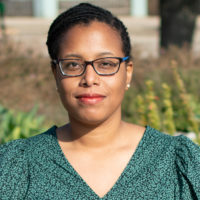 Dr. Chelsi West Ohueri is Assistant Professor of Slavic and Eurasian Studies at the University of Texas at Austin with appointments in Anthropology, African and African Diaspora Studies, and Population Health. She is a sociocultural and medical anthropologist. Her scholarship focuses on racialization and belonging in Albania and the Balkan region, global race and racism, and the anthropology of health and illness. Her current book project, based upon twelve years of extensive ethnographic research, explores the meanings and makings of race and its significance for Albanians, Roma, and Egyptians in Tirana. Her research has been published in such journals as Medical Anthropology, Slavic Review, Qualitative Health Inquiry, Public Health Nursing, and Gender, Place, and Culture. Originally from Jackson, MS, West Ohueri received her BA in sociocultural anthropology from Millsaps College and her MA and PhD from UT Austin.
Dr. Chelsi West Ohueri is Assistant Professor of Slavic and Eurasian Studies at the University of Texas at Austin with appointments in Anthropology, African and African Diaspora Studies, and Population Health. She is a sociocultural and medical anthropologist. Her scholarship focuses on racialization and belonging in Albania and the Balkan region, global race and racism, and the anthropology of health and illness. Her current book project, based upon twelve years of extensive ethnographic research, explores the meanings and makings of race and its significance for Albanians, Roma, and Egyptians in Tirana. Her research has been published in such journals as Medical Anthropology, Slavic Review, Qualitative Health Inquiry, Public Health Nursing, and Gender, Place, and Culture. Originally from Jackson, MS, West Ohueri received her BA in sociocultural anthropology from Millsaps College and her MA and PhD from UT Austin.
VACANCIES
- COMMUNICATIONS COLLECTIVE
- Member-at-Large: Sociocultural Anthropology
- Additionally, all committees are often looking for members. Contact the chair if you are interested in being a part of that committee.
